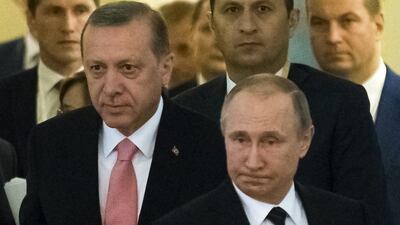Turkey has announced it will buy two S-400 surface-to-air missile batteries from Russia after signing an agreement on Friday.
The first delivery is due for the first quarter of 2020, the Undersecretariat for Defence Industries (SSM) said in a statement.
However, Moscow will not manage the systems, the SSM said, adding that the task would be carried out by Turkish personnel.
The S-400 deal, reportedly worth about $2.5 billion (Dh9.2bn), has caused concern in the West because Turkey is a member of NATO and the system cannot be integrated into NATO’s military architecture.
_______________
Read more:
US and Turkey put an end to visa spat
UAE: The Arab world will not be led by Iran and Turkey
_______________
It is the latest in a series of moves by Ankara to boost its defence capabilities as it faces threats from Kurdish and Islamist militants at home and conflicts across its borders in Syria and Iraq.
Media reports that the deal was about to be signed surfaced on Wednesday when Sergei Chemezov, head of the Russian state conglomerate Rostec, told the Kommersant daily said Russia would supply Turkey with four batteries of S-400s under the deal.
He said Moscow was expected to begin the first deliveries in March 2020 and that Turkey was the first NATO member state to acquire the advanced S-400 missile system.
The deal also signals an end to frosty relations between Moscow and Ankara, which deteriorated in 2015 when Turkey shot down a Russian air force jet that it said had crossed into Turkish airspace.
The two countries are cooperating in Syria despite having backed different sides in the civil war.
Last month, Russian President Vladimir Putin hosted Turkey's Recep Tayyip Erogan in Sochi with Iran's Hassan Rouhani to discuss the war in Syria, of which all three countries are deeply involved.

